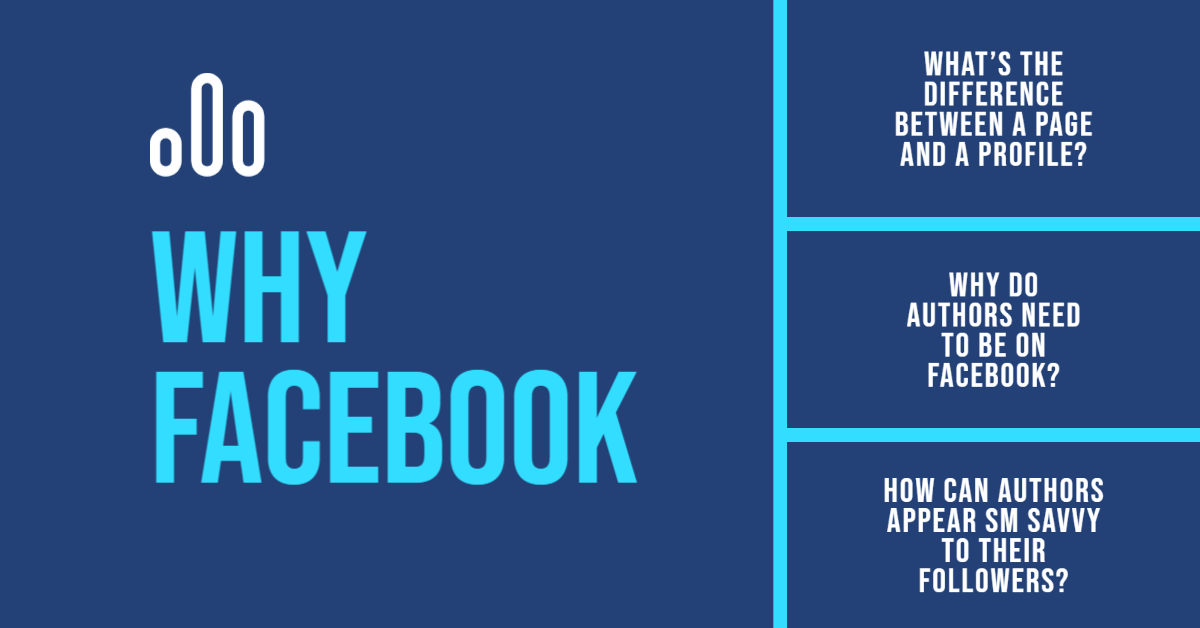|
A lot of new authors, when asked for their Facebook link, send us a link to their personal Facebook profile. What we’re looking for, and what we encourage all of our authors to develop, is a professional Facebook page. Pay careful attention to the language here -- for the purposes of this blog post, we will refer to personal Facebook profiles as “profiles” and professional Facebook pages (also known as “business pages”) as “pages.”
Sure, you already have a personal Facebook profile, so why add something else onto your plate? The answer to this question is that profiles and pages are not the same. They do not serve the same purpose, and you cannot simply trade out one for another. Let’s take a closer look at the differences between the two.
A personal Facebook profile is a great place to let your own personal audience, your friends and family, know that you have a book coming out. If you’re on Facebook personally, we certainly recommend making use of this audience. But profiles are not appropriate for professional, public author use.
For starters, unless your personal profile is “public,” your fans won’t be able to find you! The purpose of developing a Facebook presence as an author is so you can connect with fans and keep them updated about news and events. Even if your profile is “public” and fans can find you, you don’t want this kind of connection with strangers. When you accept a friend request on your personal profile, you become friends with that person in return. That means you’ll see their photos and updates in your feed, even if you have no idea who they are. They’ll also be able to see personal information that you have listed on your profile, like where you went to high school and who you’re dating -- details you may not want all your fans to know! If you have a professional Facebook page, fans can “follow” you -- meaning, they will see the updates you post on your page, but nothing you post on your profile. You will also not see any of their updates unless they directly interact with one of your posts. This is a much more appropriate creator-fan relationship. Fans aren’t your friends, lovely though they may be, and having this boundary will benefit your personal life and your professional life at the same time. You also cannot use your personal profile when collaborating with event venues, reviewers, or your publisher. For example, if we were to post on Facebook about one of our books, we couldn’t tag that author’s personal profile in our public post, because we are running a business page. If you were doing a book signing at Barnes and Noble, they could not tag you in their social media marketing efforts for that event. If a reviewer reviewed your book, they could not tag you in that review. It could lead to you missing some updates or even missing out on fans who would have followed you, if only they could! Worse, someone might choose not to collaborate with you if you’re not on social media. If a reviewer posts their reviews primarily on Facebook, and you are not on Facebook, what good does that do either of you? Even if they read the book and publish the review, they’re not getting anything out of that exchange, because they aren’t getting exposed to your audience; you’re only getting exposed to their audience. That’s not a fair trade, and lots of reviewers would pass on that sort of one-sided transaction. Furthermore, if people are searching on Facebook for “fantasy authors” or authors of your genre, you will not show up in their search if you’re only using a personal Facebook profile. In order for Facebook to categorize you in this way, you need to create a professional page and select the correct category for yourself -- in this instance, “author.” Another benefit to having a professional Facebook page you use publicly for author purposes is that you’ll look like you know what you’re doing. If someone asks for your Facebook page in a professional setting and you send them your personal profile link, it will look like you don’t understand how Facebook works, and that would affect that person’s perception of you and your capabilities as an author. Every creator these days needs to be dedicated to learning about social media -- always learning, no matter how much you know now, because social media is always changing. The bottom line is, your fans will expect to be able to find you in certain places. Just like they’ll expect your book to be available on Amazon and Barnes and Noble, they’ll expect you to have a website. They’ll expect you to be on Facebook, and possibly even Twitter or Instagram. If they can’t find you in these places, you will likely lose out on that connection, which could mean losing out on future sales or collaborations. Do yourself and your book a favor, and set up your professional Facebook page now. by Christina Kann
0 Comments
Leave a Reply. |
How Do I Book?We'll try to find the answer to that question in our blog. Archives
August 2023
Categories
All
|


 RSS Feed
RSS Feed